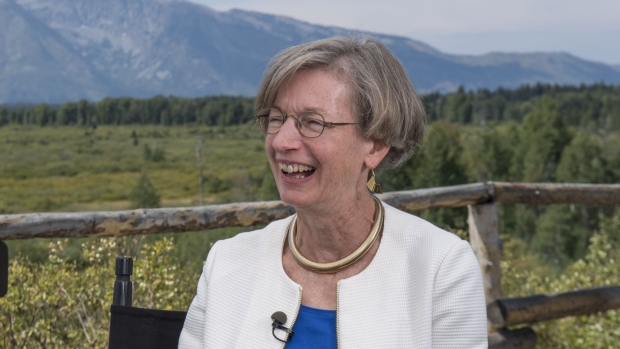Oct 3, 2022
BOE’s Mann Says Pound Drop, Energy Bailout Behind Rate-Hike Vote
, Bloomberg News

(Bloomberg) -- Bank of England policy maker Catherine Mann said a weaker pound and the UK government’s support for household energy bills were behind her push for the largest interest-rate hike in more than three decades last month.
Speaking on Monday, Mann expressed concern about the pace of monetary tightening coming from the US Federal Reserve, noting that in the past that has led to higher inflation in the UK partly by weakening the pound.
Since the September meeting, and in the wake of the government’s mini-budget, the pound fell to a record-low against the dollar, before recovering some lost ground.
“A tightening of monetary policy in the United States has tended to be inflationary contact through the channel of sterling depreciation,” she said in a panel discussion with academic economists on Monday.
UK central bank’s most prominent hawk explained her vote to raise interest rates 75 basis points last month, a quarter point higher than the majority endorsed. Markets are now expecting a hike of 100 basis points or more in November.
Expectations for more hikes have jumped after Prime Minister Liz Truss’s decision to bring in unfunded tax cuts while also protecting households from further increases in electricity and natural gas prices.
Mann said that it was “premature” to judge the “extent this particular budget is going to affect the monetary policy trajectory decisions,” but added “if people don’t have to spend their money on heating their apartments, or homes, they are now we’re in a position to redirect some of that spending on to other goods and services.”
“So it’s that ability to redirect expenditures on goods and services, that becomes an important consideration for the monetary policy trajectory,” she said.
Bank officials are trying to rein in inflation, which is lingering near a 40-year high and about five times the 2% target. Mann said she’s looking more closely at prices than wages to get a handle on the outlook and that she’s concerned about the prospect that expectations for inflation are “drifting” away from the BOE’s anchor.
“I do see increasingly embedded inflation, and I do see inflation expectations drifting,” Mann said in a panel discussion with academic economists. “I do see a spillover, and I do see daylight between real incomes and real consumption possibilities.”
Wading into a debate about whether the BOE should target money supply, Mann also said there’s an “unstable relationship” between money supply and inflation that means the BOE should look at “other indicators” in assessing the outlook for prices.
©2022 Bloomberg L.P.






